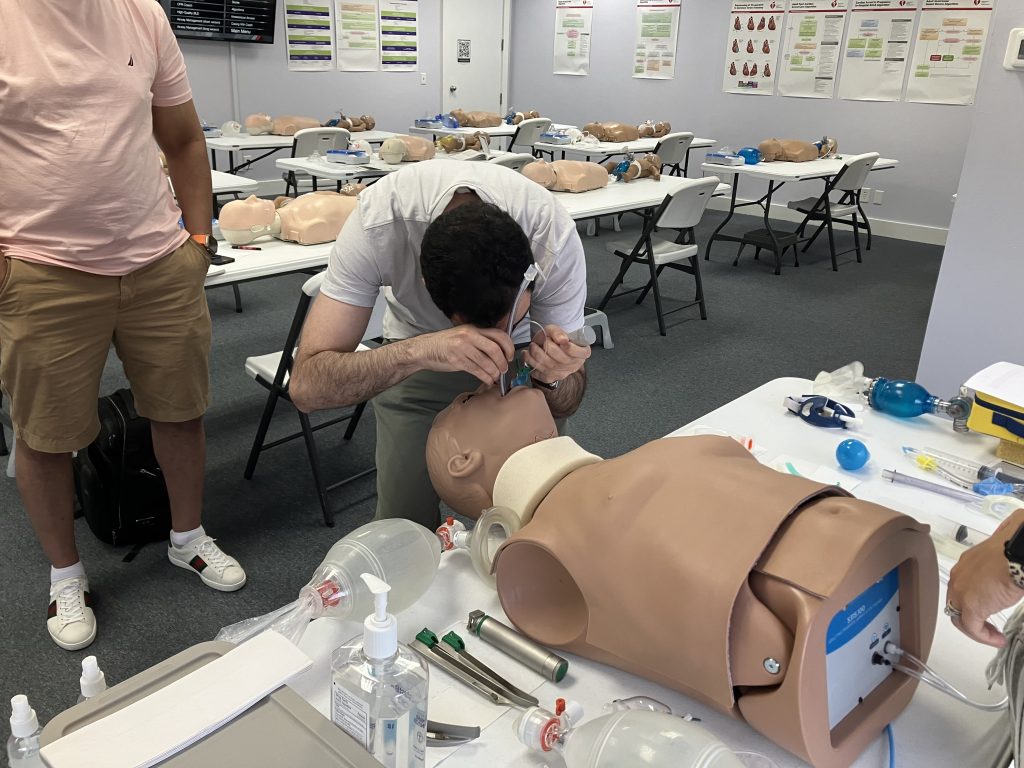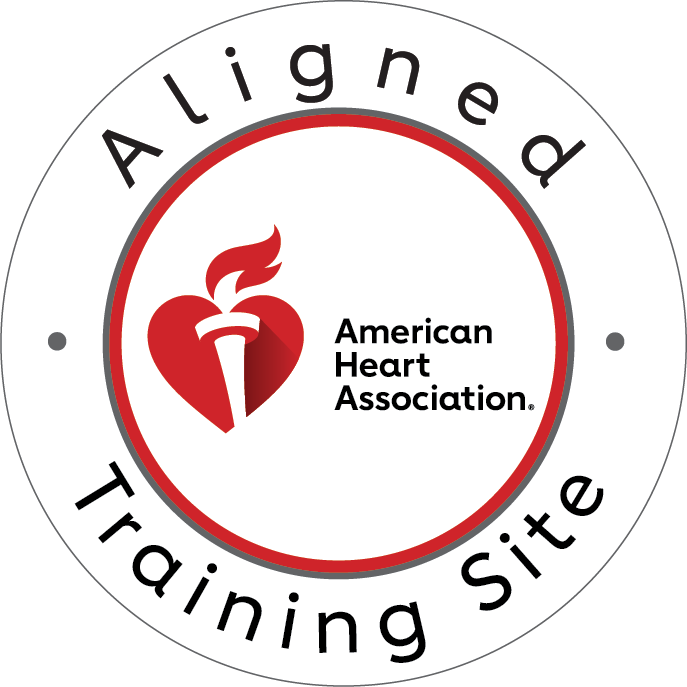Understanding Hybrid CPR Classes in Kansas City
Choosing the right CPR training can save lives. Kansas City residents now have access to both traditional and hybrid CPR classes. This decision affects how quickly you learn, how well you retain skills, and whether the training fits your schedule.
Recent studies show that both methods produce competent rescuers. The key lies in understanding which approach matches your learning style and availability.
What Are Hybrid CPR Classes?
Hybrid CPR classes combine online learning with hands-on practice. You complete theoretical instruction through digital modules at your own pace. Then, you attend a shorter in-person session to practice chest compressions, rescue breathing, and AED use on training manikins.
Research demonstrates that blended CPR training requires less time than traditional methods—typically 18 minutes of online learning plus 30 minutes of hands-on practice. This streamlined approach saves time while maintaining quality.
The American Heart Association endorses this format. Students complete online training at their own pace and on their own schedule, anywhere an internet connection is available, then attend in-person hands-on sessions for CPR and psychomotor skills.
Traditional CPR Training: The Proven Method
Traditional CPR classes deliver all instruction face-to-face. An instructor guides you through theory and practice in a single session. This typically lasts between two to four hours, depending on the course level.
This method provides immediate feedback. You can ask questions in real-time. The instructor observes your technique and corrects errors on the spot. Many learners appreciate this direct interaction and structured environment.
Comparing Effectiveness: What Science Reveals
Knowledge Retention
Scientific evidence shows that theoretical knowledge, practical skills, and CPR quality are comparable in both groups throughout the study duration, indicating that blended CPR training is as effective as traditional CPR training.
A 2024 study published in JMIR Medical Education examined CPR skill retention across different training methods. The findings reveal that 6-month refresher training sessions maintain high-quality CPR skills effectively, and self-learning modules work as well as instructor-led sessions for refreshers.
Skill Performance
Mean compression depth measured 5.21 cm in the blended group and 5.24 cm in the traditional group, demonstrating that blended CPR training was non-inferior to traditional training in compression depth after initial training.
Both methods teach you to:
- Deliver correct compression depth and rate
- Position your hands properly
- Maintain complete chest recoil
- Use an AED effectively
- Provide rescue breaths when appropriate
Time Efficiency
Studies show longer duration for standard CPR training (20 minutes to 6 hours) compared to hybrid (4 minutes to 1.5 hours) and online CPR training methods (1 minute to 1.5 hours).
For busy Kansas City professionals, healthcare workers, and parents, this time savings matters significantly. Hybrid CPR classes in Kansas City allow you to complete theory during lunch breaks, evenings, or weekends before attending a focused hands-on session.
Advantages of Hybrid CPR Classes in Kansas City
Flexibility
You control when and where you study theory. Watch videos during your commute or review materials before bed. This self-paced approach reduces stress and accommodates diverse schedules.
Cost-Effective
Hybrid courses often cost less. Training facilities need fewer instructors per session. They can serve more students with the same resources. These savings frequently transfer to students through lower course fees.
Consistent Content
Everyone receives the same theoretical instruction. Video modules eliminate variability in how different instructors present material. This standardization ensures all students learn the latest American Heart Association guidelines.
Environmental Benefits
Fewer in-person hours mean less travel. This reduces your carbon footprint and saves on transportation costs. For organizations training multiple employees, this benefit multiplies across all participants.
Benefits of Traditional CPR Training
Immediate Interaction
Ask questions as they arise. Your instructor addresses confusion immediately. This real-time feedback prevents you from practicing incorrect techniques.
Social Learning
Training alongside other students creates a supportive environment. You learn from watching others’ mistakes and successes. This peer learning enhances understanding and retention.
Complete Immersion
Traditional classes eliminate external distractions. You focus entirely on CPR for the session duration. This immersive experience helps some learners absorb information more effectively.
Hands-On Time
Traditional courses typically offer more practice time with manikins. Extended hands-on sessions build muscle memory. Repetition reinforces proper technique until it becomes automatic.
Which Method Should You Choose?
Choose Hybrid CPR Classes in Kansas City If You:
- Have a busy, unpredictable schedule
- Learn well from visual and digital content
- Want to review materials multiple times
- Prefer studying at your own pace
- Need certification quickly
- Work irregular hours
Choose Traditional CPR Training If You:
- Prefer face-to-face instruction
- Learn better through direct interaction
- Want maximum practice time
- Have schedule flexibility
- Enjoy group learning environments
- Need immediate answers to questions
The Importance of Regular Refreshers
Research suggests that the recommended frequency for renewing CPR knowledge and skills is 12 weeks, which may be considered in new strategies aimed at promoting CPR education to the public.
CPR skills deteriorate without practice. Both hybrid and traditional students need periodic refreshers. Six-month refresher training sessions effectively maintain high-quality CPR skills.
Consider scheduling brief practice sessions quarterly. Many training centers, including CPR Kansas City, offer quick skill checks to maintain your proficiency between full recertifications.
Hybrid CPR Classes in Kansas City: Meeting Modern Needs
Kansas City has embraced blended learning for CPR certification. This approach serves diverse populations—from healthcare professionals at research hospitals to teachers in suburban schools.
The COVID-19 pandemic increased demand for alternative CPR training methods that allow safe, effective instruction. Hybrid models emerged as the solution, combining safety with quality education.
Local training centers now offer both formats. You can choose based on your specific needs, learning preferences, and schedule constraints.
Making Your Decision: Practical Considerations
Assessment Matters
Both formats require you to demonstrate competency. You must pass hands-on skills tests and written exams. The certification you receive is identical regardless of the format chosen.
Instructor Quality
Success depends partly on instructor expertise. CPR Kansas City employs American Heart Association-certified instructors for all courses. This ensures high-quality instruction, whether you choose a hybrid or traditional format.
Technology Requirements
Hybrid courses require reliable internet access and a device for online modules. Ensure you have these resources before enrolling. Technical difficulties can delay completion.
Learning Style
Reflect honestly on how you learn best. Do you absorb information better through self-study or instructor-led discussion? Your answer guides your choice.
The Future of CPR Training in Kansas City
Various methods, including discussions, simulations, and technological innovations such as CPR feedback devices and potential future use of virtual or augmented reality platforms, enhance the learning experience.
Technology continues to advance CPR education. Future innovations may include virtual reality simulations, smartphone-based feedback, and artificial intelligence coaching. These developments will make training more accessible, engaging, and effective.
Kansas City stands ready to adopt these innovations. Local training centers invest in updated equipment and teaching methods to serve the community better.
Why CPR Certification Matters
Every year, thousands experience cardiac arrest outside hospitals. Only 41.7% of out-of-hospital cardiac arrest adult patients receive bystander CPR, yet bystander-witnessed adult arrests where CPR was initiated had 13.0% survival to hospital discharge compared with 7.6% survival for unwitnessed arrests.
Your certification directly impacts survival rates in your community. Whether you choose hybrid CPR classes in Kansas City or traditional training, you gain skills that save lives.
Start Your CPR Certification Journey Today
Don’t wait for an emergency to wish you knew CPR. Both hybrid and traditional formats provide excellent training. The “best” choice depends on your individual circumstances, learning preferences, and schedule.
Ready to get certified? CPR Kansas City offers both hybrid CPR classes in Kansas City and traditional courses. As an American Heart Association training site, we provide initial certifications and renewals in BLS for Healthcare Providers, ACLS, PALS, and CPR and First Aid. All our classes are stress-free and hands-on, designed to build your confidence and competence.
Take the first step toward becoming a lifesaver. Contact CPR Kansas City today to discuss which CPR certification in Kansas City option works best for you. Our experienced instructors will help you select the format that matches your needs and learning style. Visit us to register for upcoming hybrid CPR classes in Kansas City or traditional sessions. Your community needs more trained responders—become one of them.
Frequently Asked Questions
Q: Is hybrid CPR training as effective as traditional in-person classes?
Yes, research confirms that hybrid CPR training produces the same quality outcomes as traditional methods. Students in both formats achieve comparable compression depth, proper hand placement, and correct CPR technique. The key difference is flexibility—hybrid courses let you complete theory online before attending a shorter hands-on session. Both formats require you to demonstrate skills on training manikins and pass the same certification standards. The American Heart Association endorses hybrid learning as an effective alternative to traditional classes.
Q: How long does it take to complete hybrid CPR classes in Kansas City?
Hybrid CPR classes typically require 18 to 30 minutes for the online theory portion, which you complete at your own pace. The in-person hands-on session lasts approximately 30 minutes to 2 hours, depending on the course level (basic CPR, BLS, ACLS, or PALS). You can finish the online portion in one sitting or break it into multiple sessions over several days. Most students complete the entire hybrid course in less total time than traditional classes, which usually run 2 to 4 hours continuously. This flexibility makes hybrid training ideal for people with demanding schedules.
Q: Do I need to take refresher courses after completing my initial CPR certification?
Yes, regular practice maintains your CPR skills and knowledge. Most CPR certifications require renewal every two years through the American Heart Association. However, research shows that skills begin declining after just 12 weeks. Consider taking refresher courses or practice sessions every 3 to 6 months to maintain proficiency. Both hybrid and traditional formats offer quick refresher classes that review techniques and update you on any guideline changes. CPR Kansas City provides convenient refresher options for both certification types, helping you stay prepared to respond effectively in emergencies.





